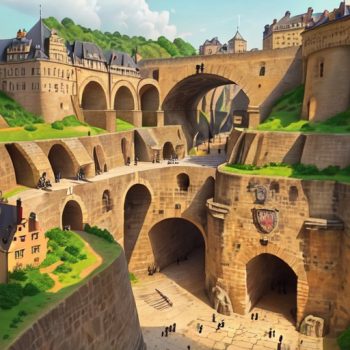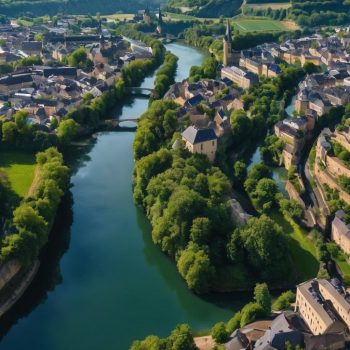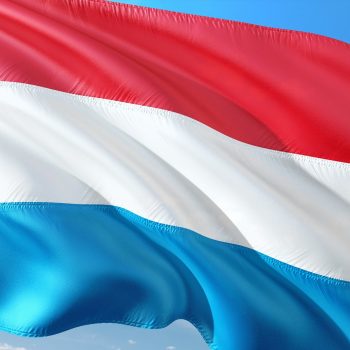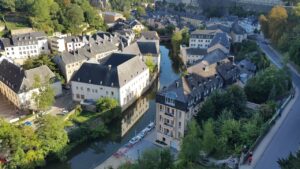In this blog post, we will explore some interesting Luxembourg country facts. We will cover everything from its history and geography to its culture and economy. We will also provide tips for planning your trip to this amazing country.
There’s something for everyone in Luxembourg, whether you’re a history buff, a foodie, or just someone who loves to travel. Check out the information below to learn more about Luxembourg!
Table of Contents
A brief overview of Luxembourg’s unique identity
The country of Luxembourg is situated in the heart of Europe between Belgium, France, and Germany, and it has a unique and rich identity influenced by its diverse history and culture. It is the only grand duchy in the world.
Luxembourg has been around for over 10,000 years. The Romans, Franks, Spanish, and Austrians have all ruled Luxembourg over the centuries. As a result, Luxembourg’s architecture, language, and cuisine have been influenced by so many different cultures and influences.
Luxembourg country facts: Luxembourg has three official languages: Luxembourgish, French, and German. It’s a Germanic language closely related to German; however, has its own grammar and vocabulary. German and French are also widely spoken in Luxembourg, and English is getting more popular too.
Although Luxembourg has a high standard of living, it has kept its rich heritage and culture intact. You can see that in the country’s medieval castles, historical towns, and picturesque villages.
Teaser about the blend of heritage and modernity
Visitors to Luxembourg will enjoy medieval castles and historic towns, as well as modern conveniences and amenities.
The city itself is the perfect combination of history and modernity that Luxembourg has to offer. There are underground fortifications in the city called the Bock Casemates, which are a UNESCO World Heritage Site. Besides the modern skyscrapers and museums, the city has lots to offer.
Another example of Luxembourg’s blend of heritage and modernity is the Moselle Valley. This region is known for its picturesque villages, vineyards, and castles. However, it is also home to modern industries, such as winemaking and tourism.
Luxembourg is a country that has something to offer everyone. Whether you are interested in history, culture, nature, or simply want to enjoy a relaxing vacation, Luxembourg is the perfect destination for you.
Luxembourg’s Historical Significance
The origins of Luxembourg as a country
Luxembourg (Luxembourg country facts) is one of the oldest countries in Europe, with a history dating back over 10,000 years. The first inhabitants of Luxembourg were the Celts, who were later conquered by the Romans in the 1st century BC. The Romans built a number of fortifications in Luxembourg, including the Bock Casemates, which are now a UNESCO World Heritage Site.
In the 5th century AD, Luxembourg was conquered by the Franks, who were a Germanic people. The Franks established the County of Luxembourg, which was ruled by a succession of different counts and dukes. In 963 AD, the County of Luxembourg was raised to the status of a duchy.
In the 11th century, Luxembourg became part of the Holy Roman Empire. The Holy Roman Empire was a loose confederation of Germanic states that existed from the 9th to the 19th centuries. Luxembourg remained part of the Holy Roman Empire until its dissolution in 1806.

Historical events and influences
Because Luxembourg is right in the middle of Europe, it has been invaded and occupied by a bunch of different powers over the centuries.
In 1443, Luxembourg was acquired by the House of Burgundy. The Burgundians were a powerful dynasty that ruled over a large part of Europe in the 15th century. In 1477, the Burgundian inheritance passed to the Habsburgs, who ruled over Luxembourg for the next 400 years.
During the 17th and 18th centuries, Luxembourg was a major battleground in the European wars of religion. In 1697, Luxembourg was fortified by the French military engineer Sébastien Le Prestre de Vauban. Vauban’s fortifications made Luxembourg one of the most impregnable cities in Europe.
As part of the French Revolutionary Wars, Luxembourg was conquered by France in 1795. It stayed under French rule until 1815, when the Congress of Vienna granted them independence.
Luxembourg’s role in the World Wars
Luxembourg’s neutrality was violated during both World Wars. In 1914, Luxembourg was invaded by Germany during World War I. Germany occupied Luxembourg for the duration of the war.
In 1940, Luxembourg was again invaded by Germany during World War II. Germany annexed Luxembourg and forced it to become part of the Third Reich. Luxembourg remained under German occupation until 1944, when it was liberated by Allied forces.
Despite its small size, Luxembourg country facts, Luxembourg has played an important role in European history. Luxembourg’s strategic location has made it a key battleground in many of Europe’s wars. There have been lots of important history figures in Luxembourg, like the Counts of Luxembourg and the Dukes of Burgundy.

Geography and Location
Luxembourg’s landlocked position in Europe
Landlocked Luxembourg is surrounded by Belgium to the north and west, Germany to the east, and France to the south. It is one of the smallest countries in Europe, covering just 2,586 square kilometers (998 square miles).
Luxembourg’s landlocked position has both advantages and disadvantages. On the one hand, it makes Luxembourg more vulnerable to invasion and attack. On the other hand, it has also made Luxembourg a crossroads for trade and commerce. Luxembourg is located on important transportation routes between Western Europe and Central and Eastern Europe.
The Moselle River and its significance
The Moselle River is the most important river in Luxembourg. It flows through the eastern part of the country and forms the border between Luxembourg and Germany. The Moselle River is navigable for most of its length, and it is used for both commercial and recreational purposes.
The River is also important for its scenic beauty. The river valley is lined with vineyards and medieval and picturesque villages. The Moselle Valley is a popular tourist destination, and it is known for its wine, food, and scenery.
The Moselle is also important for its economic significance. It is home to a number of industries, including winemaking, tourism, and agriculture. The Moselle River is also a vital transportation route for Luxembourg.
Luxembourg country facts:The Moselle River is an integral part of Luxembourg’s geography, culture, and economy. It is a river that is both beautiful and important.
Luxembourg’s Cultural Heritage
The Luxembourgish language and culture
The Luxembourgish language and culture are a unique blend of Germanic and Romance influences. Luxembourgish is a West Germanic language that is closely related to German. However, it has its own unique grammar and vocabulary. Luxembourgish is the official language, and it is spoken by over 75% of the population of luxembourg.
Luxembourgish culture is also a blend of Germanic and Romance influences. This is evident in the country’s food, music, and literature. Luxembourg is also home to a number of traditional festivals and celebrations.

Influence of French and German cultures
French and German have both had a significant influence on Luxembourgish culture. This is due to the fact that Luxembourg has been ruled by both France and Germany at different times in its history.
French is widely spoken in Luxembourg, and it is one of the official languages of the country. French is used in government, business, and education. German is also widely spoken in Luxembourg, and it is the other official language of the country. German is used in government, business, and education.
The influence of French and German culture can be seen in Luxembourg’s architecture, food, and music. For example, Luxembourgish cuisine is a blend of French and German cuisine. Luxembourgish architecture is also a blend of French and German architecture.
UNESCO World Heritage Sites in Luxembourg
There is one UNESCO World Heritage Site in Luxembourg: the City of Luxembourg: its Old Quarters and Fortifications. This site includes the historic center of Luxembourg City, as well as the Bock Casemates, a network of underground fortifications that date back to the Middle Ages.
The City of Luxembourg: its Old Quarters and Fortifications is a unique and well-preserved example of a medieval fortified city. The site is also a testament to the country’s rich history and culture.
Luxembourg country facts: Luxembourg’s cultural heritage is a unique blend of Germanic and Romance influences. The country’s language, culture, and architecture are all products of its diverse history. Luxembourg’s UNESCO World Heritage Site is a testament to the country’s rich cultural heritage.
The Grand Duchy and Grand Duke
Explanation of the Grand Duchy of Luxembourg
Luxembourg is a constitutional monarchy with a parliamentary system of government. This means that the Grand Duke is the head of state, but the prime minister and the government of luxembourg are responsible for the day-to-day running of the country.
Luxembourg is a unitary state, which means that there are no regional or provincial governments. The central government in Luxembourg City has authority over all aspects of government.
Role of the Grand Duke as the head of state
As stated above, the Grand Duke of Luxembourg is the head of state and the symbol of the unity of the nation. The Grand Duke has a number of constitutional duties, including:
- Appointing and dismissing the prime minister and the government
- Convening and dissolving the Chamber of Deputies
- Giving assent to laws
- Representing Luxembourg on the international stage
The Grand Duke also plays a number of important ceremonial roles. For example, the Grand Duke opens the Chamber of Deputies each year and presides over state occasions.
Luxembourg’s government structure
Luxembourg’s government structure is based on the principle of separation of powers. This means that the legislative, executive, and judicial branches of government are separate and independent from each other.
The legislative branch of government is responsible for making laws. The legislative branch is made up of the Chamber of Deputies, which is a single-chamber parliament. The Chamber of Deputies has 60 members, who are elected by the people every five years.
The executive branch of government is responsible for carrying out the laws. The executive branch is made up of the prime minister and the government. The prime minister and the government are appointed by the Grand Duke.
The judicial branch of government is responsible for interpreting and applying the laws. The judicial branch is made up of a number of courts, including the Court of Cassation, which is the highest court in the land.
Luxembourg’s government structure is based on the principles of democracy, the rule of law, and human rights. Luxembourg is a member of the United Nations, the EU, and the North Atlantic Treaty Organization (NATO).
Luxembourg’s Role in the European Union
Luxembourg as a founding member of the EU
Luxembourg is one of the six founding members of the EU. The other five founding members are Belgium, France, Germany, Italy, and the Netherlands. Luxembourg signed the Treaty of Rome in 1957, which established the European Economic Community (EEC), the predecessor to the EU.
Luxembourg country facts: The country has played an important role in the development of the EU. The country has hosted a number of important EU institutions, including the Secretariat of the European Parliament, the Court of Justice of the European Union, and the European Investment Bank. Luxembourg is also one of the three official capitals of the EU, along with Brussels and Strasbourg.
Importance of Luxembourg City as an EU capital
Luxembourg City is one of the three official capitals of the EU. This means that Luxembourg City plays an important role in the decision-making process of the EU. The European Parliament holds a number of its plenary sessions in Luxembourg City each year. The Court of Justice of the EU also holds its hearings in Luxembourg City.
Luxembourg City is also a major financial center. The Luxembourg Stock Exchange is the second largest stock exchange in the eurozone. Luxembourg is also home to a number of international banks and financial institutions.
Economic significance and GDP per capita
Luxembourg is a small country, but it has a strong economy. Luxembourg has the highest GDP per capita in the world. The country’s economy is based on a number of sectors, including finance, logistics, and tourism.
Luxembourg is a member of the eurozone and the Schengen Area. This means that Luxembourg uses the euro as its currency and that there are no border controls between Luxembourg and other Schengen member states.
Luxembourg is a wealthy country with a high standard of living. The country has a low unemployment rate and a strong social safety net. Luxembourg is also a very safe country.

Modernity and Luxembourg Today
Contemporary Luxembourg City
Luxembourg City is the capital and largest city of Luxembourg. It is a modern and cosmopolitan city with a rich history and culture. Luxembourg City is home to a number of important international institutions, including the Secretariat of the European Parliament, the Court of Justice of the European Union, and the European Investment Bank.
Luxembourg City is also a major financial center. The Luxembourg Stock Exchange is the second largest stock exchange in the eurozone. Luxembourg is also home to a number of international banks and financial institutions.
Luxembourg City is a vibrant and multicultural city with a lot to offer visitors. There are a number of historical and cultural attractions in the city, such as the Grand Ducal Palace, the Notre Dame Cathedral, and the Bock Casemates. Luxembourg City is also home to a number of restaurants, bars, and shops.
Luxembourg’s place in the European Economic Community
Luxembourg is one of the founding members of the European Economic Community (EEC), the predecessor to the European Union (EU). The EEC was established by the Treaty of Rome in 1957. The EEC was a common market that allowed for the free movement of goods, services, capital, and people between member states.
Luxembourg has played an important role in the development of the EEC and the EU. The country has hosted a number of important EU institutions, such as the Secretariat of the European Parliament, the Court of Justice of the EU, and the European Investment Bank. Luxembourg is also one of the three official capitals of the EU, along with Brussels and Strasbourg.
Luxembourg is a strong supporter of European integration. The country believes that the EU is essential for peace and prosperity in Europe. Luxembourg is also committed to deepening the EU’s single market and to strengthening the EU’s economic and political union.
Luxembourg’s progressive policies and values
Luxembourg is a progressive country with a strong commitment to human rights and equality. Luxembourg is one of the first countries in the world to legalize same-sex marriage and to introduce a national minimum wage. Luxembourg is also a leader in environmental protection. The country has set ambitious targets to reduce its carbon emissions and increase its use of renewable energy.
Luxembourg is also a multicultural and tolerant society. The country is home to people from over 170 different nationalities. Luxembourg is committed to promoting social cohesion and integration.
Here are some specific examples of Luxembourg country facts and progressive policies and values:
- Luxembourg was one of the first countries in the world to legalize same-sex marriage in 2015.
- Luxembourg introduced a national minimum wage in 2019.
- Luxembourg has set ambitious targets to reduce its carbon emissions by 40% by 2030 and to achieve net-zero emissions by 2050.
- Luxembourg is a member of the Schengen Area, which allows for the free movement of people between member states without border controls.
- Luxembourg is home to a number of international organizations that promote human rights and democracy, such as the Office of the High Commissioner for Human Rights (OHCHR) and the Office for Democratic Institutions and Human Rights (ODIHR).

Conclusion
Luxembourg is a small country with a rich history, culture, and economy. It is a founding member of the EU and a major financial center. Luxembourg is also a leader in environmental protection and progressive social policy.
A recap of keys – Luxembourg country facts:
- Luxembourg is a Grand Duchy, with the Grand Duke as the head of state.
- Luxembourg is one of the smallest countries in Europe, with a population of just over 600,000 people.
- Luxembourg has the highest GDP per capita in the world.
- Luxembourg is a major financial center, with the Luxembourg Stock Exchange being the second largest stock exchange in the eurozone.
- Luxembourg is a founding member of the EU, the North Atlantic Treaty Organization (NATO), and the United Nations (UN).
- Luxembourg is a member of the Benelux economic union, which also includes Belgium and the Netherlands.
The enduring charm of “Where Heritage Meets Modernity”
Luxembourg is a country that blends heritage and modernity in a unique and harmonious way. The country’s capital city, Luxembourg City, is a UNESCO World Heritage Site, with a well-preserved medieval old town. However, Luxembourg City is also a modern and cosmopolitan city, with a vibrant business community and a diverse population.
Luxembourg’s countryside is also a blend of heritage and modernity. There are many medieval castles and villages scattered throughout the country, but there are also modern farms and businesses. Luxembourg is also a leader in renewable energy, with a number of wind farms and solar parks located throughout the country.
Don’t hesitate to visit Luxembourg
Luxembourg is a beautiful and welcoming country with something to offer everyone. Whether you are interested in history, culture, nature, or simply want to relax and enjoy the good life, Luxembourg is the perfect destination for you.
I hope you will consider visiting Luxembourg in the future. You won’t be disappointed!
Hopefully you enjoyed these interesting facts about Luxembourg. If you have any questions, please leave a comment.s

